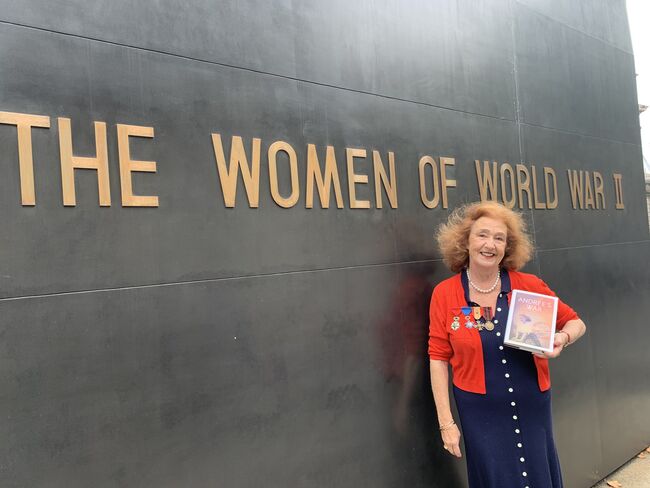
Andrée’s War Part 3: "My mother’s WW2 exploits inspired me to write a book about her"
Published:
Categories:
We explored Andrée Griotteray White’s journey into becoming an agent in the French Resistance in Part 1 of our Women’s History Month series, and some of Andrée’s most dangerous moments in Part 2. In the third and final blog, we speak with Andrée’s daughter Francelle, about what inspired her to write her book ‘Andrée’s War’.
You have told us all about Andrée’s role in the French Resistance, but how did you find out about her exploits?
It came in bits and pieces. I remember when the IRA were bombing London in 1974 and one day my mother said, “Oh, they'll never get them,” and I said, “How do you know?” And she said, “Oh, because of the way the cells are organised. They're organised like we were.”
It wasn’t until my father had died that my mother started telling me stories. And they were anecdotes, that just came out at random times. She told me about the meeting with the German General when she was cooking dinner. One time I mentioned I’d slept somewhere awful when I went travelling to Mexico, and she replied saying when she was a courier in the Resistance, she slept in a brothel at one point! So, the stories just came up throughout the years but as time went on, the stories got less and less, and very few people knew of them.
When I was young, I never thought of my mother as brave as I grew up with it and just assumed everybody in France has been part of the Resistance. It wasn’t until I wrote the book I realised the risks she took and how brave she was.

Can you tell us about some of the awards and medals your mother received?
We attended a party was on the 8th May 1995 to celebrate 50 years since the end of the Second World War. Francois Mitterrand, the French President at the time, awarded my mother a military Legion d'Honneur and it was given to her by her brother who was a member of the French Parliament. Andrée was put forward for the Legion d'Honneur by Lionel Jospin, who was the French Défense Minister at the time.
My mother had been given the Croix de Guerre avec Palmes in 1944 by General de Gaulle and the Medaille de La Resistance by General de Gaulle in 1945. Only 38,288 Medailles de la Resistance were awarded to living persons at the end of WW2 and 24,463 posthumously.
She was also awarded the French Order of Merit in 1972, and that was very moving for us as a family – at that time my grandmother, aunt and uncle were there to attend it.
Why did you write the book in your mother’s honour?
My mother developed dementia in 1997 which was very difficult to deal with. She was such a strong and forthright woman, and it was hard to see her decline. I had to work out how to cope with it, so I decided to use her amazing wartime story, which I thought people would be interested in, to show that people with dementia lived amazing lives. Whether they had children, travelled, started new hobbies – they had achievements before they developed this awful disease.
The book took two years because I did a lot of research. I went to Paris, into the archives of Police Headquarters, Ministry of Défense archives, and then I went down to the Pyrenees. I also went to the chateau, which was their base.
Can you tell us about your mother’s Alzheimer’s diagnosis and how that affected you?
The whole thing was horrendous. It’s not like today, when you have wonderful charities and support groups – they didn’t exist. We were faced with this situation where this magnificent lady had been so strong, beautifully dressed, confident…and then she started to behave in a strange way. Nobody understood it. She was 76 when she initially started showing symptoms – I remember she had just been given the Legion of Honour, and she had a lot of difficulty navigating the Eurostar. She knew how to work it previously, but suddenly she couldn’t work it out. We went to one doctor after another, but they couldn’t give us answers. She had dementia for 19 years in total – it progressed over a very long period of time. My mother eventually passed away in December 2016. It was a very emotional time.
As a result of my mother’s diagnosis and my father’s RAF career, I wanted to support the RAF Benevolent Fund. I visited the Fund’s Cambridge Dementia Reminiscence Group last year. It’s a space for RAF veterans, spouses and carers to get together, communicate and build new connections. We had nothing like that when my mother was going through it, so I was really impressed with the groups and how they benefit people. I provided a donation of £50,000 to go towards the groups, and I’m thrilled that the Groups are expanding year on year and supporting new people. My book, Andrée’s War is also available to buy on the RAF Benevolent Fund’s website, where 100% of the profits will go directly to the charity.
Read Part 1 and Part 2 of Andrée’s story.
To purchase Francelle White’s book ‘Andrée’s War,’ email francellewhite@outlook.com and state you are a supporter of the RAF Benevolent Fund. 100% of profits will be donated to the RAF Benevolent Fund.